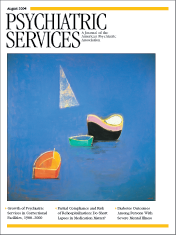To the Editor: Patients with psychiatric disorders may benefit from online groups, often called eGroups. However, few researchers have investigated factors related to the satisfaction of eGroup participants. In March 2000 we established a Web-based self-help psychiatric group (http://groups.yahoo.com/group/psychpark-friend). Most participants were patients of a virtual psychiatric clinic called PsychPark (
1) and had a diagnosis of depression or an anxiety disorder. The virtual clinic, which is operated by members of the Taiwan Association of Mental Health Informatics, has been described in detail elsewhere (
2). The eGroup consisted of a discussion forum and mailing list. Posted messages were sent to the forum and to all members anonymously. The authors moderated the group by filtering and deleting unrelated messages and advertisements.
A Web-based interactive yes-no questionnaire based on Yalom's 12 therapeutic factors (
3) was designed to evaluate satisfaction with the eGroup; space was included for comments and suggestions. The participants were invited to fill out the online survey form when they logged on to the PsychPark Web site.
Approximately 1,300 members logged on to the Web site during the study period—March through November 2001. On average, 152 messages were posted each month; 281 of the 1,300 members (22 percent) posted messages over the nine-month period. A total of 262 members (19 percent) completed the survey. Their mean±SD age was 25.7±5.5 years. Most were female (194 respondents, or 74 percent). A large proportion were students (113 respondents, or 43 percent), and 131 respondents (50 percent) had at least an undergraduate education.
A total of 198 respondents (76 percent) reported that they were satisfied with the eGroup. Three factors were most commonly endorsed as accounting for satisfaction: 182 respondents (92 percent) cited "imparting information"; 172 (87 percent) cited "universality"; and 168 (85 percent) endorsed "instillation of hope." Only two factors were endorsed by less than 70 percent of respondents: "catharsis" (115 respondents, or 58 percent) and "existential factors" (131 respondents, or 66 percent). From a list of suggestions for improving satisfaction with the eGroup, the most frequently endorsed items were "introduce more professional guidance" (90 respondents, or 34 percent), "provide specific solution methods" (77 respondents, or 29 percent), and "establish specific diagnosis-related groups" (72 respondents, or 27 percent).
To our knowledge, our survey is the first to evaluate the satisfaction of participants in a Web-based group by using Yalom's therapeutic factors. Our results indicate that an anonymous eGroup is useful for clients with psychiatric disorders. Our findings are consistent with those of Davidson (
4), who determined that a large group can function effectively on the Internet. Participants in such groups value the information, positive feedback, and encouragement that they receive from other group members, as suggested by the items in our survey that were cited as most related to satisfaction. The factors that were least cited as being related to satisfaction—catharsis and existential factors—may have to do with the virtual nature of our group, whereby members do not meet face to face. However, large groups have some limitations. Weinberg (
5) compared a large group to a fishbowl, where only a small number of members participate while the larger membership quietly watches. This phenomenon was apparent in our group. About a fifth of the participants posted messages while the other members observed the online interaction quietly.
The generalizability of our results is limited by the relatively low response rate and possible selection bias related to characteristics of members of our virtual clinic.

